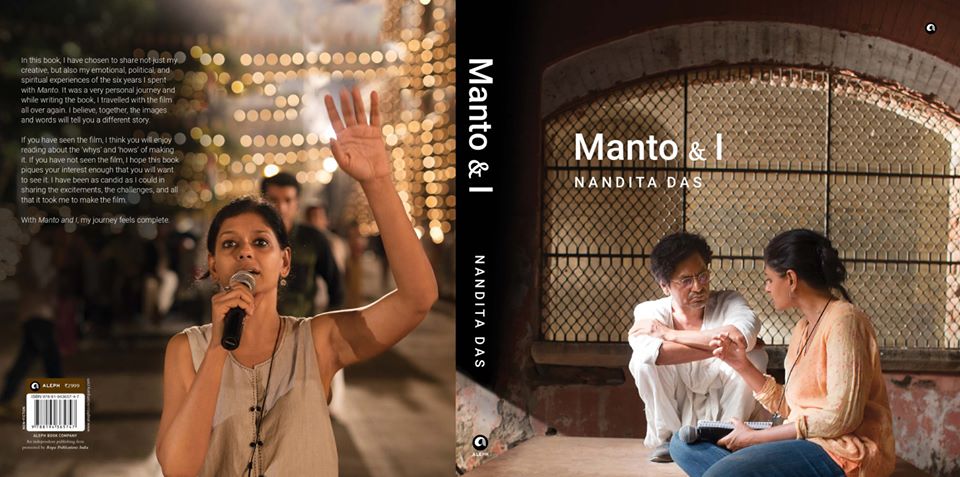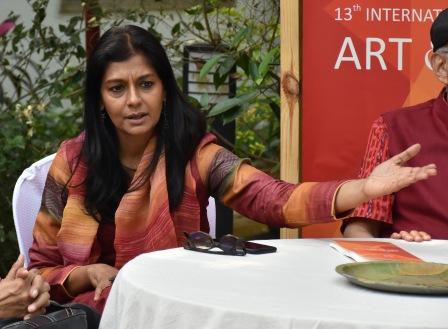
She is fearless, she is outspoken. A self-professed feminist, Nandita Das is a woman of myriad shades. An actor par excellence, Das has done numerous women-oriented roles in her long career. But in recent times she has made her mark as a film director who dares. Her debut movie was based on a horrific incident India ever faced. Her debut movie ‘Firaaq’, was based on the 2002 Gujarat violence and ‘Manto’ is based on the life of Indo-Pakistani author and writer Saadat Hasan Manto and shows his life during the Partition when he had to leave India and move to Pakistan. Now, after the movie on Manto’s life, Das turned the experience of the movie into a book, ‘Manto and I’ which was launched recently. In an interview with Arindam Ganguly of Orissa POST at the 13th International Film Festival on Art and Artists, she speaks about the joys and challenges of recreating Bombay and Lahore of the 1940’s for the film.
Why did you decide to publish a book on Manto after making a film on the same subject?
I have personally always enjoyed being privy to an artist’s journey, their process. From childhood, I used to watch my father paint and it was fascinating how lines would become forms. So I thought others might find it interesting to read my journey of making my film, Manto. Also, I spent more than seven years to make the film and so it would be good to chronicle the journey in the form of a book. I have chosen to share not just my creative, but also my emotional, political, and spiritual experiences of the six years I spent with Manto. I knew Manto and Iwere going to travel together through this very personal journey. I believe, together, the images and words will tell you a story you haven’t seen on screen. If you have seen the film, I think you will enjoy reading about the ‘whys’ and ‘hows’ of making it. If you have not seen the film, I hope this book piques your interest enough that you will want to see it. You will be privy to the intimate process I have been through while making the film. I have been as candid as I could in sharing the excitement, challenges, trials and tribulations of making the film.
How you see your journey with ‘Manto’?
In 2012, when I decided to make my second directorial movie, I had no idea what it would entail. One of the toughest challenges was to recreate the two cities— Bombay and Lahore— of the 1940s in the midst of modern day clutters. We had a limited budget. From the beginning, I saw Nawazuddin as Manto. His ‘lived-life’ eyes were perfect to portray Manto’s many contradictions. Rasika was also my first and only choice for Safia, Manto’s wife. To find Shyam, his best friend, took the longest. Most actors saw it as a ‘second lead’! My casting director, Honey Trehan, had the unenviable task of finding people to bring alive real-life characters like Ashok Kumar, K. Asif, Faiz Ahmad Faiz, Naushad sahab and many more. He has found such amazing actors—thanks to him, we have a fantastic ensemble cast. And I’m overwhelmed that so many actors did small cameos for free, simply to support the film and for their admiration of Manto. Rishi Kapoor as a sleazy producer or for that matter, Paresh Rawal who, despite our political differences, supported both Firaaq and Manto. Gurdas Maan, as a distraught father (not easy to imagine him as that), or Javed Akhtar, as a witness defending Manto in court, were brilliant to say the least.
How relevant is your film to the present scenario?
The film is relevant as the situation during Partition and that of now due to CAA and NRC issues, are similar. Certain sections of society are living in fear, there is identity politics and religion, as marker of citizenship, is diving us. During Partition too these conditions were prevalent. Today, instead of focusing on growing unemployment, economic meltdown, so many environmental and social challenges and issues of health and education, the government is wasting time, money and energy in a banal exercise of asking people to prove their citizenship. I do believe art has the capacity to reach out to people without polarizing the issue, it challenge prejudices and make us more empathetic human beings.
Why is the film industry divided on issues of CAA and NRC?
It is not possible for the entire industry to be united on the issue, just as society isn’t. And that is applicable to every industry and sector. Not too different from the media industry. But as artists it is our duty to be responsible as we do have a significant circle of influence. But we should not force our ideas on anyone.
What is your viewpoint about movies which have a propaganda?
Art is a powerful tool as it subtly goes into people’s subconscious, influencing their responses. But for the same reason art has also been misused. Hitler used films as a mode to propagate his ideas. But I fiercely believe in freedom of expression and I will never stop or object to another artist’s work. If I value my freedom, I must also value everyone else’s too. Instead of stopping others from making films that we may not like, we should focus on creating parallel narratives that reflect the reality of the society.
Two big women oriented movies, Chappak and Panga, failed to get box office success. What more, according to you, is needed for such movies to be a success?
There are so few films about women that even if one film fails at the box office, people generalise that womenoriented film don’t work. There are many male-oriented films also that don’t work. The main thing is that the diversity that exists in society must be reflected in films. Women are 50% of the population and such a small percentage of filmmakers are women. We also need to tell our stories, our gaze needs to be seen. Some will work and some won’t. But voices need to be heard as that will open doors for many more.
What are your views on the positive response to IFFAA?
It is so overwhelming to see such a large audience coming in despite bad weather and I want to thank Orissa POST and other media organizations for supporting the endeavour and helping us spread the word. We are hoping tomorrow too people will come and enjoy the feast of good cinema, workshops and talks.
She
